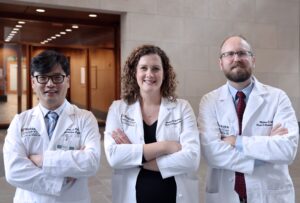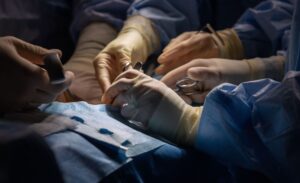Lymphedema
Lymphedema is a progressive, debilitating condition that affects up to 250 million people worldwide. It is characterized by an accumulation of fat or fluid, usually in the arms or legs, that can cause swelling, pain, numbness and tingling. The condition can be caused by a number of factors, ranging from bacterial infection to surgical trauma of the lymphatic system. In the U.S., the most common form of this condition is breast cancer-related lymphedema, or BCRL.
Overview
In advanced lymphedema, excess fluid may build up and prevent mobility of the affected arm or leg. Left uncontrolled, this condition also may lead to an infection of the skin called cellulitis, as well as an infection of the lymph vessels (lymphangitis) and cancer (lymphatic malignancies). To prevent these complications, it’s important to treat lymphedema in its early stages. Our specialists are experienced in treating this condition using techniques that are aimed at providing relief and promoting healing.
Breast Cancer-Related Lymphedema
In the U.S., women who have had lumpectomies or mastectomies along with significant sentinel lymph node biopsies (removal of large clusters of lymph nodes in the armpit area) are at the highest risk for developing lymphedema. Lymph nodes in this region provide lymphatic drainage for the arms. When enough of these lymph nodes are removed, their loss may affect the body’s ability to efficiently move fluid back and forth.
For early-stage lymphedema, lifestyle changes and medical and therapeutic interventions are the first steps in care. These non-surgical methods may offer relief from lymphedema without surgery. However, in some instances lymphedema doesn’t respond to these initial interventions and supermicrosurgery or other special treatments may be needed.
When lymphedema has reached the advanced stage, surgery usually is required. A technique called vascularized lymph node transplant can be used to transfer lymph nodes from one area of the body to the affected area. In some situations, this treatment can help improve lymph drainage and slow the progression of the disease.
Wound Care
The Washington University Surgical and Wound Care Clinic at Barnes-Jewish Hospital provides top-notch care for wounds and ulcers related to lymphedema. Our surgical and wound care team is committed to helping patients find the best path to recovery. Your care team will work with you to develop an individualized treatment plan and help you fully understand your options and make informed health care decisions.
Vascular and Lymphatic Anomalies
The team of experts at the Washington University Vascular Anomalies Clinic use a wide-spanning multidisciplinary approach to diagnose and treat lymphatic malformations and other vascular anomalies. At the Vascular Anomalies Clinic, you have access to cutting-edge advances in vascular and lymphatic care, including interventional treatments, medical therapy and symptom management methods.
For children and adolescents, the Vascular Lesions Clinic at St. Louis Children’s Hospital provides specialized pediatric care for vascular and lymphatic anomalies.
Lymphedema Therapy
Washington University provides both physical therapy and occupational therapy services to manage lymphedema symptoms. Physical therapy and occupational therapy help you manage your symptoms through patient education and a preventive approach to care. Washington University’s expert certified lymphedema therapists help you learn methods to reduce swelling caused by lymphedema and care for your body while managing symptoms day to day.
Certified Lymphedema Therapists provide individualized treatment sessions to teach skin care, infection control, safe exercises, lymphatic drainage techniques, bandaging methods and tips and recommendations for long-term compression garment usage. The team is committed to educating you on all aspects of care for your lymphedema and to helping you manage symptoms and integrate your care plan into your daily life.
Surgical Techniques
Surgery for lymphedema may be an option if the condition continues to get worse even with therapy and other nonsurgical treatments. There are different types of lymphedema surgery. These procedures fall into two main categories: physiologic procedures and ablative procedures.
Physiologic Procedures
Physiologic procedures, including vascularized lymph node transplant and lymphovenous bypass, rewire the lymphatic system to restore the natural flow of lymphatic fluid in the body.
During vascularized lymph node transplant, your surgeon transfers a healthy lymph node from one area of the body to the affected area. This transplanted lymph node acts as a sponge to absorb lymphatic fluid and direct it into the vascular system.
Lymphovenous bypass involves connecting lymphatic vessels to veins. After this procedure, lymphatic fluid moves around the blockage in the lymph node and drains directly into the venous system.
Your surgeon may combine vascularized lymph node transplant with lymphovenous bypass during the same operation.
Ablative Procedures
Ablative procedures decrease the volume of the affected area by removing excess tissue. Types of ablative procedures include surgical excision and debulking with suction assisted liposuction. Surgical excision removes excess skin, fibrotic tissue and fat from the affected area. Debulking procedures use suction to remove fat from the affected area. Ablative procedures are typically used only for advanced-stage lymphedema.
Conditions & Treatments
Our nationally recognized surgeons are dedicated to focusing on your unique lymphedema needs and the following conditions:
- Lymphedema of the arms and legs
- Pneumatic compression
- Excess fluid and fat build-up
- Swelling
- Limb pain
- Cellulitis
- Lymphangitis
- Lymphatic malignancy
- Ulcers
- Lymphoscintigraphy (imaging of the lymphatic system)
- Complete decongestive therapy (CDT)
- Manual lymph drainage
- Compression garments
Why Choose Us?
Our lymphedema treatment program is managed by a team of specialists working in collaboration with Washington University physicians from other fields of medicine. This multidisciplinary approach, coupled with our use of advanced and innovative techniques, means we can offer early detection for lymphedema and precise diagnosis and treatment. Our specialized reconstructive surgeons also work closely with lymphedema therapists to provide high-level comprehensive care.
What to Expect
Once you request an appointment, our scheduling team will call you to schedule your initial consultation. You will first meet with one of our specialists and then receive care from a collaborative team of lymphedema experts.


